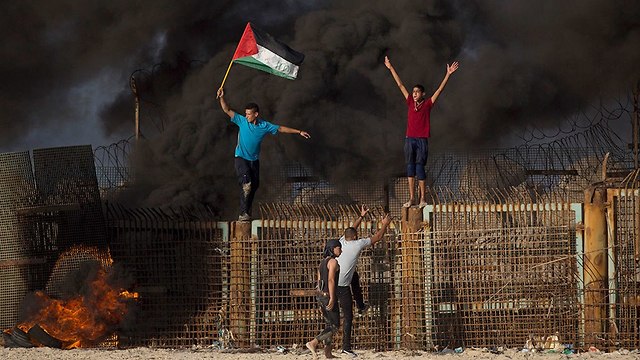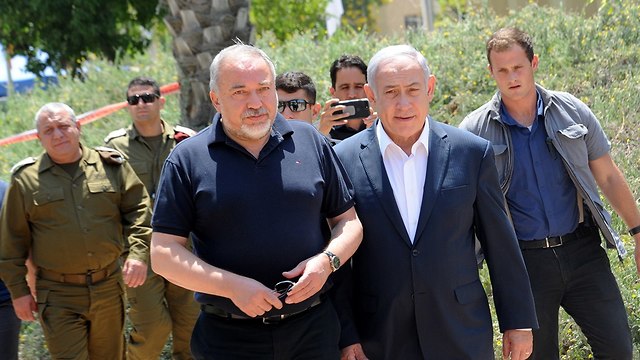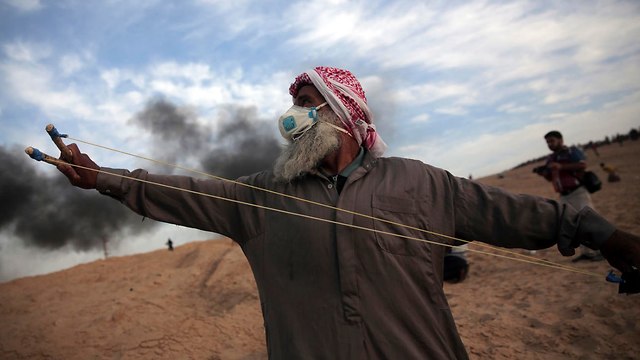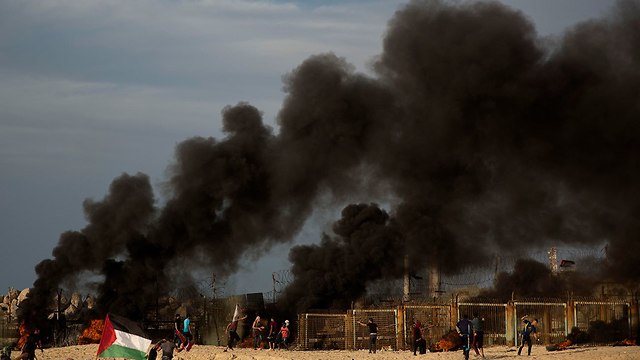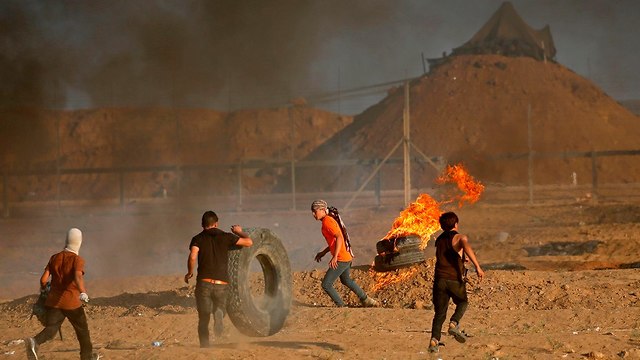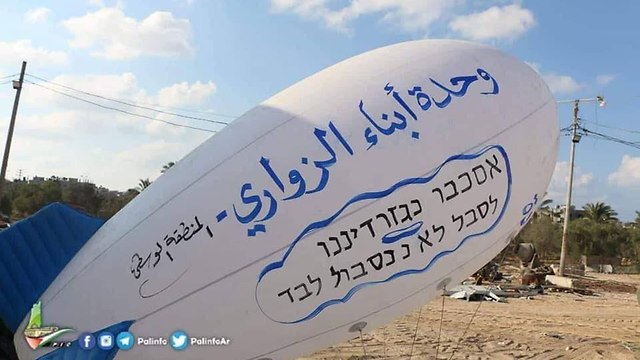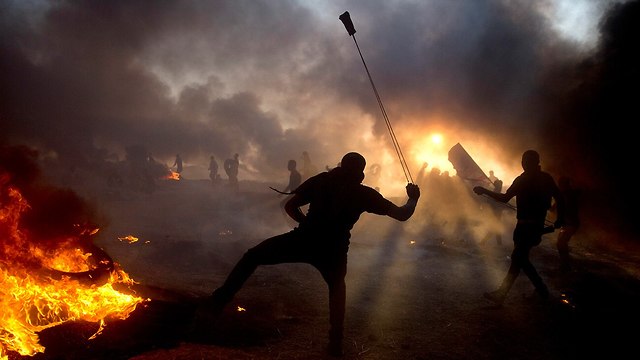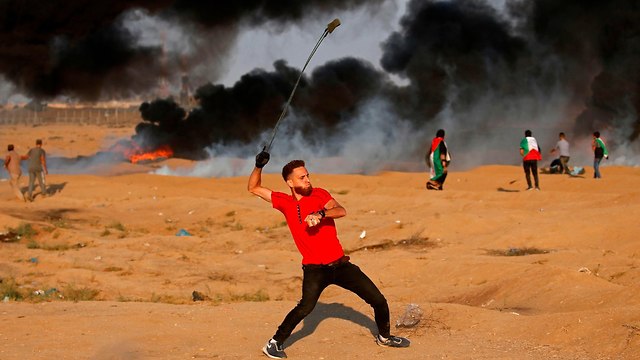
Election minded rhetoric could lead to escalation in Gaza
Op-ed: Israel must remain wary lest its conflict management be interpreted by Hamas as weakness, but a rational analysis of the current situation in Gaza demonstrates that, although not ideal, it is far superior to the alternative—a bloody, protracted IDF operation in the strip. However, our politicians are reluctant to admit this to the electorate.
This is why despite the fact that Hamas is constantly escalating the provocations (infiltrations) on the border and continues digging tunnels, the decision has been made on several different occasions recently to avoid military moves that "exact a price," which the IDF has already planned and is ready to carry out. The same decision was made in the Cabinet meeting on Sunday.
Except that the current Israeli government, mostly due to political considerations relating to the elections that are likely coming sooner than later, does not dare unhesitatingly tell the Israeli public that this is its position, and so it condemned itself to frustrating restraint. Instead, every time that Hamas goes too far in its provocations, Netanyahu and Lieberman both put on a show of anger, saying their patience has expired—or is about to expire—while at the same time they qualify their statements, adding that they're giving Hamas "one last chance."
Unlike them, another Cabinet minister, Nafatli Bennett, truly means what he says when he demands to pulverize the Gazans from the air; but during Cabinet discussions, after he hears the heads of the defense establishment, he too is a lot less combative than during his public mud-slinging with Lieberman.
The problem is that this pre-elections belligerent rhetoric which is all too common in the Israeli political arena nowadays, there's a dynamics that could lead us to an unnecessary escalation that would extract a much heavier, bloodier price than we're currently paying for the clashes on the border.
Even the most militant politician understands that a situation in which the Palestinians have over 200 dead and thousands of wounded as a result of the clashes on the border, while Israel has one soldier dead and another wounded, is better than a situation in which a ground military operation in the strip will lead to dozens of casualties on our side, with the southern and central parts of the country running to shelter every few hours for weeks on end. Furthermore, the IDF is currently stopping the clashes on the border with a small team of snipers, a number of combat battalions and a small number of tanks and drones, at a cost that is not unusual and more typical of routine security operations.
On the other hand, every military move—even if it lasts for less than 50 days (like Operation Protective Edge) will require the IDF to recruit reservists, open up the war reserves store units, and chip away at stockpiles of weapons and spare parts, among other things. All of this would cost billions of shekels.
Apart from that, in the current situation the construction work to establish an obstacle on the Gaza border continues undisturbed and it is likely that when the obstacle is ready in about six months, it will provide a better solution to the terror tunnels problem. A military operation would disrupt the schedule of this important strategic-defensive component.
In addition, we haven't yet mentioned the possibility of violent unrest in the West Bank in response to the cries that would undoubtedly come out of the Gaza Strip. We also have to consider the possibility that the Iranians, Hezbollah and Syrian President Bashar Assad's regime will try to take advantage of the fact the IDF is busy in Gaza to further boost their strength or even to mount an attack on the Lebanon-Syria front.
What will a military operation in Gaza achieve?
On the international level, too, Israel will have to contend with a number of difficult legal, media and diplomatic challenges if it embarks on a large operation in Gaza. The biggest question of all is: for what purpose? What will we achieve there that we have not achieved in previous operations? If we want a few years of calm for the residents of the western Negev and especially for the Gaza border communities, we can still achieve this through mediation by the Egyptians and the UN envoy.
Israel already believes that, regardless of what is happening on the Gaza border fence, it must do all in its power to alleviate the distress of the citizens of Gaza and especially to prevent a humanitarian crisis in the territory. This, on condition that the military wing of Hamas does not exploit the opening of the crossings and the easing of restrictions in order to strengthen its military power.
When considering this rational and non-emotional calculation, it is easier to excuse the damaged honor, to control the anger and to agree that the clash with rioters on the fence, the extinguishing of fires and the complacent attitude towards the minor damage caused by the incendiary balloons and the smoking tires in the Gaza vicinity communities are far superior to the price that we will have to pay if the IDF embarks on a major battle in the Gaza Strip at the present time.
The matter of eroding deterrence
The only drawback of avoiding a strong military strike on Hamas at present is the eroding deterrence. There are already clear signs that this is happening. Hamas, in recent days, has been more daring and less cautious in its provocations, assuming that Israel will not dare to act against it. As a result of this situation, Hamas may draw the wrong conclusions and try to achieve some sort of windfall.
Therefore, we must be careful not to become complacent so that the rioters will not take advantage of the current and relatively thin deployment of the IDF along the Gaza fence to carry out mass incursions into Israeli territory, abduct soldiers and civilians for bargaining purposes and carry out attacks in adjacent communities using the remaining tunnels.
It is important that the cabinet ministers, especially Netanyahu and Lieberman, cease issuing threatening pronouncements in order to please their electoral base, and focus on an ongoing practical dialogue with senior officers of the General Staff and the Shin Bet security service to ensure the country is prepared for a change in the situation.
A time will surely come when the IDF will have to strike Hamas and the Palestinian Islamic Jihad in the Gaza Strip with a decisive blow, but it should only happen after it is clear that all political-civil settlement efforts have categorically failed.
In such a situation—which we are already very close to now—both Hamas and Israel will be left solely with the military option to use as leverage to escape the current bloody and exhausting dead end. Only then will an IDF military operation in Gaza really be a "war of no choice."










